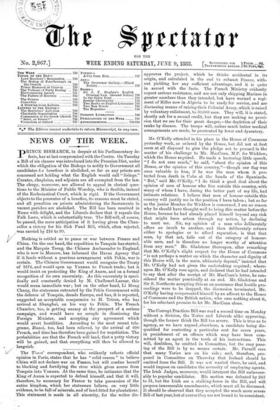NEWS OF THE WEEK.
pRINCE BISMARCK, in despair at his Parliamentary defeats, has at last compromised with the Centre. On Tuesday a Bill of six clauses was introduced into the Prussian Diet, under which the obligation of the Bishops to notify to Government all candidates fur benefices is abolished, so far as any priests are concerned not holding what the English would call "livings." Curates, chaplains, and adjoints are all exempted from the law. The clergy, moreover, are allowed to appeal in clerical questions to the Minister of Public Worship, who is flexible, instead of the Ecclesiastical Court, which is rigid. If the Government objects to the presentee of a benefice, its reasons must be stated, and all penalties on priests administering the Sacraments in vacant parishes are abolished. The Bill has been received in Rome with delight, and the Liberals declare that it repeals the Falk Laws, which is substantially true. The Bill will, of course, be passed, the mere anticipation of it having given the Chancellor a victory for his Sick Fund Bill, which, often rejected, was carried by 216 to 99. VNothing is settled as to peace or war between France and China. On the one hand, the expedition to Tonquin has started, and the Marquis Tseng, the Chinese Ambassador to England, who is now in Moscow, has informed the Havas Agency that if it lands without a previous arrangement with Pekin, war is certain. The Chinese Government would recognise the Treaty of 1874, and would open up Yunnan to French trade ; but it would insist on protecting the King of Anain, and on a formal recognition of its own suzerainty. As this suzerainty is specifically and constantly denied by M. Challemel-Laconr, this would mean immediate war ; but on the other hand, Li Hung Chang, the statesman entrusted by the Pekin Government with the defence of Tonquin, dreads Europe, and has, it is reported, suggested an acceptable compromise to M. Tricon, who has arrived at Shanghai, on his way to Pekin. The French Chamber, too, is getting uneasy at the prospect of a serious campaign, and would have no scruple in dismissing the Foreign Minister, and accepting any agreement which would avert hostilities. According to the most recent telegrams, Hanoi, too, had been relieved, by the arrival of 600 French, and time has therefore been gained for negotiation. The probabilities are that the French will land, that a petty victory will be gained, and that everything will then be allowed to languish.
.t/ The Times' correspondent, who evidently reflects official
opinion in Paris, states that he has "solid reason" to believe China will not declare war on France, but will confine herself to blocking and fortifying the river which gives access from Tonquin into Yunnan. At the same time, he intimates that the King of Anam is expected to defend himself, and that it will, ..therefore, be necessary for France to take possession of the entire kingdom, which her statesmen believe, on very little evidence, to be full of minerals, and of land fitted for plantations. This statement is made in all sincerity, for the writer dis
approves the project, which he thinks accidental in its origin, and calculated in the end to exhaust France, without yielding her any sufficient advantage, and it is quite in accord with the facts. The French Ministry evidently expect serious resistance, and are not only shipping Marines in greater numbers than they intended, but have warned a regiment of Rifles now in Algeria to be ready for service, and are discussing means of raising their Colonial Army, which is raised by voluntary enlistment, to 30,000 men. They will, it is stated, shortly ask for a second credit, but they are making no provision that we see for their great danger,—the depletion of their ranks by disease. The troops will, unless much better medical arrangements are made, be prostrated by fever and dysentery.


































